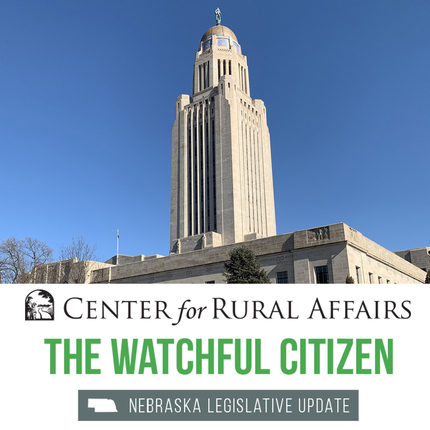“The salvation of the state is in the watchfulness of the citizen.” — Hartley Burr Alexander
The first week of the Nebraska legislative session saw the introduction of more than 200 new bills and resolutions. This week, senators will continue to introduce new bills ahead of the Jan. 18 deadline. Each bill introduced will be scheduled for a hearing in 1 of 14 standing committees.
We value your input as we engage with the legislative process. If you would like to share your support, concerns, insights, or opposition by providing testimony in-person, via letter, or by visiting with your senator, please do not hesitate to contact me at carliej@cfra.org or 402.687.2100 ext. 1032.
Here are the bills we are following:
Economic development
Legislative Bill (LB) 45 (Dorn) – Support: Many rural communities struggle with empty and deteriorating buildings. Legislative Bill (LB) 45 establishes the Revitalize Rural Nebraska Grant Fund, which would provide funds for communities to demolish these dilapidated buildings. Second class cities (cities with a population greater than 800, but less than 5,000) and villages (communities with a population of less than 800) applying for these funds are prioritized; remaining funds are made available to first class cities (cities with a population greater than 5,000 and less than 100,000). If there are excess funds left at the end of the year, they will roll over to the Revitalize Rural Nebraska Grant Fund to the next fiscal year. LB 45 appropriates $10 million annually to be transferred from the General Fund to the Revitalize Rural Nebraska Fund, which will be overseen by the Department of Environment and Energy. Referred to the Urban Affairs Committee.
Health and safety
LB 62 (Cavanaugh, M.) – Support: Medicaid medical providers and patients alike have struggled in rural clinics with giving and receiving care due to lack of available translation services. LB 62 would provide coverage for all necessary translation and interpretation services for eligible recipients using a medical assistance program service. These services include, but are not limited to. laboratory, clinic, physician, pregnancy-related, and mental health. Referred to the Health and Human Services Committee.
Food and agriculture
LB 84 (Day) – Support: In 2021, the Legislature relaxed eligibility requirements to receive benefits from the Supplemental Nutrition Assistance Program (SNAP), increasing the threshold from 130% of the federal poverty level (FPL) to 165%. Without action, this change will expire on Sept. 30. This would result in a family of three earning more than $29,000 annually losing these benefits during a time when inflation is impacting every aspect of life and particularly groceries. LB 84 would keep the income eligibility for SNAP benefits at 165% of FPL. Referred to the Health and Human Services Committee.





